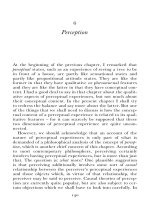Introduction to noun clauses
Bạn đang xem bản rút gọn của tài liệu. Xem và tải ngay bản đầy đủ của tài liệu tại đây (8.84 KB, 2 trang )
Introduction to noun clauses
A noun clause
is a group of words that contains a subject and a verb. It acts as a noun. Note that a noun clause
cannot stand alone. It is a subordinate clause and it needs to be attached to an independent clause.
A noun clause can be the subject or object of the verb in the main clause.
Study the examples given below.
What you said
was not right.
Here the noun clause ‘what you said’ acts as the subject of the verb
was
.
Another example is given below.
What she did
was to let out a scream.
Here the noun clause ‘what she did’ acts as the subject of the verb
was.
In the following examples, the noun clause acts as the object.
I don’t know
what she thinks.
Here the noun clause ‘what she thinks’ acts as the object of the verb
know.
She said that
she would come.
Here the noun clause ‘that she would come’ acts as the object of the verb
said
.
A noun clause can begin with a question word.
The clauses given below are all examples of noun clauses.
where she lives
what I think
how she makes a living
who he is
what his name is
Do you know
where she lives?
I don’t know
how she makes a living?
Do you know
who he is?
Do you know
what his name is?
A noun clause can begin with the conjunction
if
or
whether
.
I don’t know
if I will have time.
I don’t know
if I will pass.
I don’t know
whether he will recognize me.
A noun clause can begin with ‘that’.
She said
that she would come.
He said
that he didn’t know the answer.
A noun clause can begin with
a question word + to-infinitive.
I don’t know
what to say.
(= I don’t know what I should say.)
Be first to know when grammar rules change! Sign up to our newsletter here: englishgrammar.org (It's free)
Powered by TCPDF (www.tcpdf.org)









